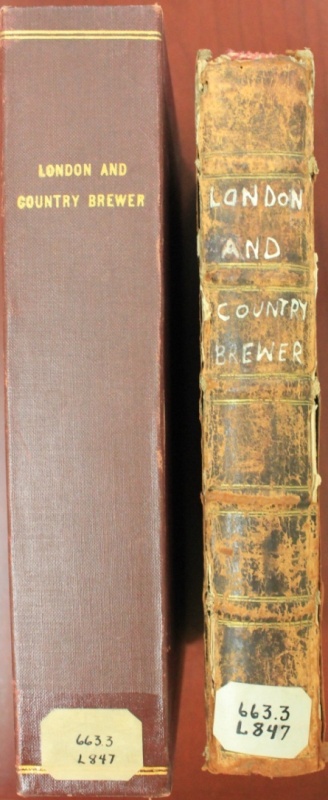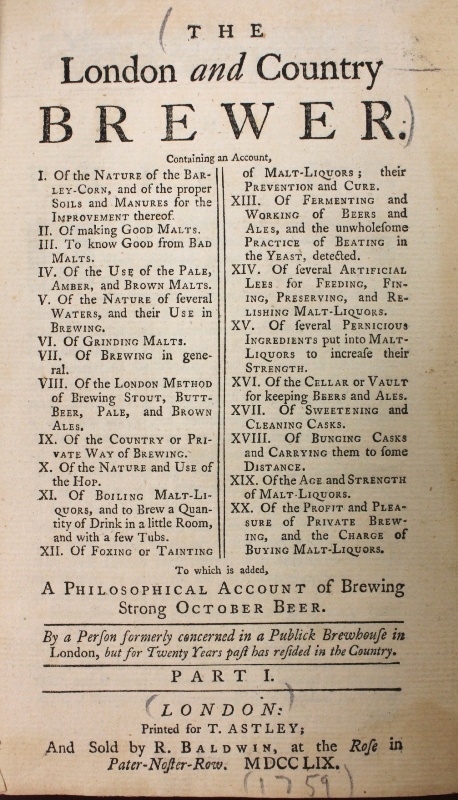Last month in the Communicator, I described the Smithsonian's American Brewing History Initiative. I wrote about how homebrewing was a core, cultural endeavor that ultimately evolved into a commercial craft beer industry, not once, but at least twice, in very similar fashion, fully 400 years apart. It is with great joy that I am able to add another “chapter” to that heritage-filled story.
I revisited Brewed in America: A History of Beer and Ale in the United States, by author and historian Stanley Wade Baron. Originally written in 1962, several chapters deal with efforts to encourage the shift from “ardent spirits” to malt liquors and beer, which, in turn, includes several accounts of homebrewing.
It is the chapter, “Thomas Jefferson: Gentleman Brewer” that piqued my interest, especially in light of a discovery I had made at the Anheuser-Busch Corporate Library Archives. I have always been intriqued by Jefferson, and my personal library contains many volumes written by him and about him. As we all know, he was a true American genius with a world-class curiosity. At Monticello, his mountaintop plantation that he designed and built in Albemarle County near Charlottesville, Virginia, Jefferson lived out his life evolving not only as a successful politician, but also as an architect, scientist, farmer, philosopher, inventor, and... homebrewer! The general public is usually aware of Jefferson's affinity for fine wines, but Stanley Baron tells the story of his affinity for beer. And later in life, his regular beer purchases gradually evolved into an interest in brewing his own beer.
 Jefferson was an intensely detailed record keeper. Baron illustrates the degree of this obsession by highlighting Jefferson's journal entry of “...the odd penny to a beggar.” His expenditure records also include the purchases of malt and hops as “provisions” necessary at Monticello. Baron conjectures that these purchases must have been exclusively for homebrewing for pleasure. As detailed as Jefferson was in his record keeping, there is no evidence that he ever sold any of the beer that he brewed at Monticello.
Jefferson was an intensely detailed record keeper. Baron illustrates the degree of this obsession by highlighting Jefferson's journal entry of “...the odd penny to a beggar.” His expenditure records also include the purchases of malt and hops as “provisions” necessary at Monticello. Baron conjectures that these purchases must have been exclusively for homebrewing for pleasure. As detailed as Jefferson was in his record keeping, there is no evidence that he ever sold any of the beer that he brewed at Monticello.
Jefferson was also a prolific letter writer and reportedly wrote some 19,000 letters in his lifetime. Baron includes parts of an 1813 letter that were Jefferson's first mention of his plan to begin brewing at Monticello. The letter was written to Captain W. D. Meriwether and says in part:
I lent you some time ago The London & Country Brewer and Combrun's book on the same subject. We are this day beginning, under the directions of Capt. Millar the business of brewing Malt liquors, and if these books are no longer useful to you I will thank you for them, as we may perhaps be able to derive some information from them.
The two books Jefferson loaned to Meriwether were well-known works on brewing that had appeared in England in the first half of the 18th century. When I was exploring the Anheuser-Busch Archives, I came across none other than an original volume of The London and Country Brewer! The AB volume is a printing from 1759. It still retains its original leather-bound cover, and is housed in a protective case.
Its title page refers to its author, the book being written “by a Person formerly concerned in a Publick Brewhouse in London, but for twenty Years past has resided in the Country.”
Its contents are further described as: “containing the whole art of brewing all sorts of malt-liquors, as practised both in town and country, according to observations made by the author in four years travels through the several counties in England. Also, the method of preserving liquors in the cask, and directions to be observed in bottling them.”
 As you can see from my image of its title page (click to view larger version), The London and Country Brewer's chapter titles are quite inclusive of brewing operations. Of particular interest to me is chapter Vlll: “The London Method of Brewing Stout, Butt-Beer, Pale, and Brown Ales,” and chapter IX: “The Country or Private Way of Brewing.” These chapters imply a recognition of some distinct differences between brewing as practiced both in “town” and brewing as practiced in “country.” We continue to see the historic links between small scale homebrewing and larger scale commercial craft brewing. This London and Country Brewer distinction will certainly be explored further in a future Communicator Heritage piece.
As you can see from my image of its title page (click to view larger version), The London and Country Brewer's chapter titles are quite inclusive of brewing operations. Of particular interest to me is chapter Vlll: “The London Method of Brewing Stout, Butt-Beer, Pale, and Brown Ales,” and chapter IX: “The Country or Private Way of Brewing.” These chapters imply a recognition of some distinct differences between brewing as practiced both in “town” and brewing as practiced in “country.” We continue to see the historic links between small scale homebrewing and larger scale commercial craft brewing. This London and Country Brewer distinction will certainly be explored further in a future Communicator Heritage piece.
I enjoyed revisiting Jefferson and his brewing endeavors at his beloved Monticello, especially in light of my discovery at the Anheuser-Busch Archives. To hold in my own hands a standard brewing reference, a copy of which was part of Thomas Jefferson's personal library, was enjoyable in itself. His library actually became the core collection for what would become our Library Of Congress. And to know that none other than Thomas Jefferson practiced home brewing as evidenced by his detailed record keeping and prolific letter writing is just another confirmation of beer's role in U.S. national heritage.
